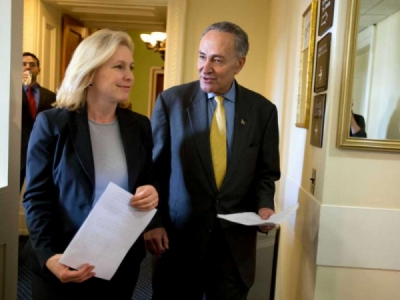
Posted on February 7, 2019
Senators Charles Schumer and Kirsten Gillibrand urged the U.S. Environmental Protection Agency not to declare that the 7-year, $1.7 billion cleanup satisfies a 2002 agreement between EPA and GE. Photo: Jacquelyn Martin
Albany – New York’s two U.S. senators are joining the state’s call that General Electric must be made to continue the PCB cleanup of the Hudson River.
Recommended Video
On Tuesday, senators Charles Schumer and Kirsten Gillibrand urged the U.S. Environmental Protection Agency not to declare that the 7-year, $1.7 billion cleanup satisfies a 2002 agreement between EPA and GE.
EPA is currently reviewing the dredging work on about 40 miles of river between Troy and Fort Edward, which concluded in the fall of 2015.
GE wants EPA to issue the company a so-called “certificate of completion” for the project, a ruling that would declare the project complies with the 2002 cleanup agreement.
Such a ruling also could absolve GE of further liability for remaining PCBs in the river, but New York state, local officials and numerous environmental groups believe that PCB levels remain too high and want the EPA to require GE to resume work.
EPA has already indicated that it would not decide on a certificate of completion until the agency first issues a long-awaited report on the project’s effectiveness. EPA has been studying that for more than 2 years and issued a tentative report that projected PCB-tainted river fish still might not be safe to eat for decades.
“We believe that the issuance of a certificate of completion under those conditions is premature and could result in continued harm to the health of the Hudson River and its ecosystems. Instead, we urge the EPA to engage with GE and New York state to continue the PCB clean-up process,” Gillibrand and Schumer wrote in a letter to EPA Acting Administrator Andrew Wheeler.
In December, a study by the state Department of Environmental Protection determined the cleanup was incomplete, with PCB levels in fish still considered unsafe under EPA standards.
EPA’s preliminary report, issued in June 2017, found that PCB levels in fish could remain at unsafe levels for five decades or more.
GE has steadfastly maintained that the dredging project was successful, and that no further dredging by the company is needed.
Said GE spokesman Mark Behan, “The data show conclusively that the Hudson River dredging project is working and will protect the environment as EPA predicted. New York state’s research affirmed that 99.8% of the sediment samples collected from the upper Hudson achieved the standards set by the EPA.”
We look forward to the EPA issuing a certification of completion on the dredging project,” he added.
Source: Times Union





